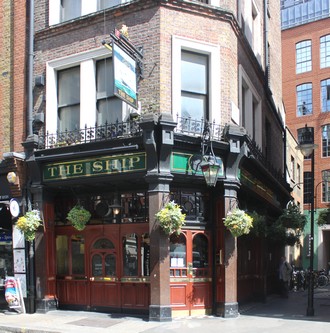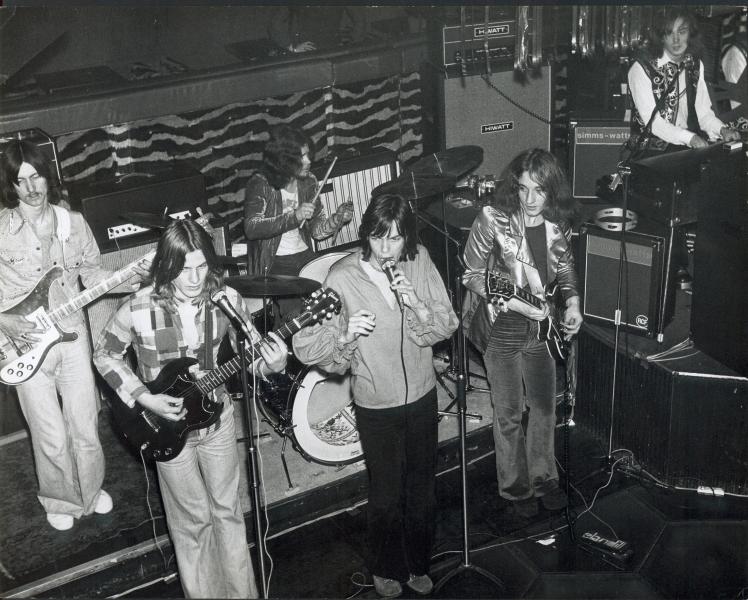The Power Of A Pint At The Ship
The Power Of A Pint At The Ship

There was no such thing as ‘networking.’ Back when I was 19 and ‘unsigned’ to label or publisher, the band simply sat around scouring Melody Maker or NME for who was who and what was what; listening to the radio, playing records, plotting our next move towards being ‘discovered’.
There was a certain amount of bliss in that ignorance. We weren’t stressed out trying to get an introduction to every executive on the planet or having to spend a fortune on Google Ad words because the internet didn’t exist and there was precious little chance of being able to meet any executive, by any means, much less a flotilla of them.
But we definitely did ‘plot.’
We knew, for instance, that a certain record company liked to drink in a certain pub on Wardour Street in the heart of London’s Soho; The Ship. So, in what now seems more nitworking than networking, the band decided to pile into the pub one night in order to try and engage various members of the label in conversation.
We discovered that most evenings the crew went from The Ship to the Marquee club a few doors down to catch some live music, albeit through a beer-smeared window between the room and the bar, and finally onto ‘the speak’, or The Speakeasy as this dimly lit after-hours den of iniquity was officially named.
That was good information. Or data as we call it now.
Regardless of how good the information or data was, a gig at The Marquee could only be got by one of two means: fame or cash and we had neither. However, we did have a friend with money. And subsequently he (Gary) kindly put up the cash to get us onto the calendar.
As we launched into our set our manager managed to pry, for at least a song or two, the reluctant label boss and his cronies out of the bar and onto the floor. They were intrigued, they called a meeting, they paid for a demo to be recorded, and we totally ignored their instructions about what to record. But, they loved what they heard and duly signed the band. A career was launched.
Could it happen again today? There’s a lot of missing parts in today’s equivalent, for sure. But today there’s also a ton of new and rather more seemingly scientific arrivals: strategies, seminars, platforms, apps, all knitted together in one giant networking sweater to protect you and then project you into starasphere.
Only they probably won’t.
With only 24 hours in everyone’s day you have the choice of seeming to do something, or actually doing it. Like the choice of calling your friends when you’re on the beach to say what a great time you’re having… as opposed to actually having a great time on the beach, i.e. without your phone or friends who didn’t want to haul their asses off the couch and join you..
All emerging artists face the problem of exposure, or rather the lack of it. The challenge is not just how to stand out but who to stand out to? You might think a target is easier to hit if it’s bigger but sometimes the opposite is true. If you narrow down your target of people you want to reach to, say, three, then you can devote a lot more energy (and guile maybe?) to reaching them. Like us boys down the pub back in the seventies.
Entering a contest is a time-honored rite of passage. Even the much-ridiculed Eurovision Song Contest has thrown up the likes of Abba, Celine Dion, Secret Garden and Lordi and others over the years. OK, so contests like Melody Maker’s Rock and Pop contest did throw up (in possibly the other sense too) bands like Splodgenessabounds, Bite The Pillow, and Robert And The Remoulds, none of whom took much of anywhere by storm aside from Splodgenessabounds of course—who can forget the punk anthem "Two Pints of Lager and a Packet of Crisps Please"? On the other hand contests like American/British/Lithuanian Idol have been relatively extremely successful in kindling new music careers. And by no means just for the winners. Which is my next point.
Aside from some obvious benefits to winning, entering a contest is a great way to just focus on who you are, what you want to do, sound like, be comfortable being categorized as. It’s a goal, a target, moreover one of the ones that falls into the second definition: relatively easy to if not score a bullseye on, to at least hit some useful vectors or quadrants.
Above all, entering a contest is a statement of faith: Here I am. This is me, or us. In today’s increasingly isolated recording world where entire musical lives can go unheard by anyone outside your immediate family, entering a contest gets you out of the house, metaphorically and hopefully literally.
Entering a contest takes a different type of effort, which is precisely the point, and it’s effort with a nicely sharpened focus. Bit like that pint at The Ship.
By Julian Colbeck

